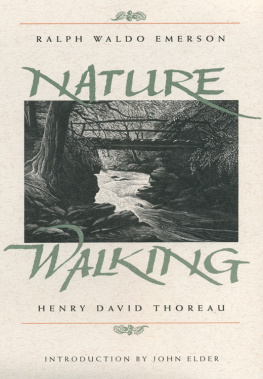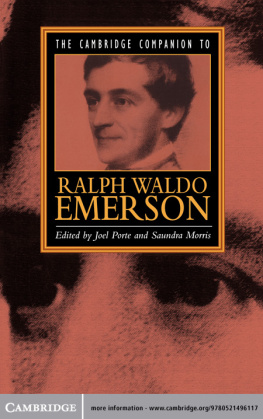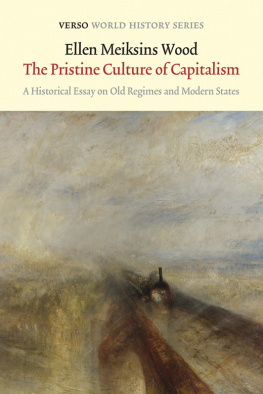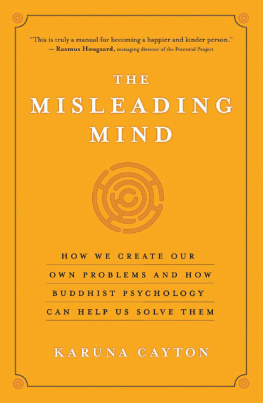1989 The University of North Carolina Press
All rights reserved
Library of Congress Cataloging-in-Publication Data
Cayton, Mary Kupiec.
Emersons emergence : self and society in the transformation of New England, 1800-1845 / Mary Kupiec Cayton.
p. cm.
Bibliography: p.
Includes index.
ISBN 0-8078-1870-4 (alk. paper)
ISBN 0-8078-4392-x (pbk.: alk. paper)
I. Emerson, Ralph Waldo, 1803-1882Political and social views. 2. CapitalismNew EnglandHistory19th century. 3. New England Social conditions. 4. New EnglandIntellectual life. 5. Social problems in literature. 6. Self in literature. I. Title.
PSI642.S58C58 1989
814.3-dc20
89-32663
CIP
Portions of Chapter 2 were originally published as Sympathys Electric Chain and the American Democracy: Emersons First Vocational Crisis, New England Quarterly 55 (1982): 3-24, and are reprinted here by permission of the New England Quarterly.
The paper in this book meets the guidelines for permanence and durability of the Committee on Production Guidelines for Book Longevity of the Council on Library Resources.
Design by April Leidig-Higgins
Printed in the United States of America
93 92 5 4 3 2
THIS BOOK WAS DIGITALLY MANUFACTURED.
For Drew
Contents
A section of illustrations can be found following
Preface
THIS BOOK has been ten years in the making. It began at a time when I had not heard of the New Historicism in literary criticism, and when historians were debating whether the intellectual history that examined figures such as Emerson was a dead endeavor.
When I began this study, my purpose was to synthesize the material available on the New Social History of early national New England and to reexamine Emersons career in the context of that information. My impression was that most historians of Emerson had started by considering the individual in isolation (taking their cue from Emerson), and had added an historical, contextual overlay when it helped them to explain otherwise difficult problems. My intent was the opposite: to foreground the emerging urban, capitalist order of the Boston region, and to look at Emerson as a product of that particular time and place. I would start with New England and see how Emerson fit in.
In the years since the manuscript was completed, my point of view has changed somewhat. From 1982 through 1988, I worked as a temporary faculty member in an institution no better and no worse in its treatment of those on the margin than most in the country. During that period, when I accomplished little else besides teaching new and different courses in new and different ways, I became interested in what theory can teach us about the overarching assumptions of disciplines and modes of discourse. I found myself stuck for a while asking questions about the nature of intellectual discourse and about its value for those who do not engage in it formally. Mostly I wondered about its relation to a dominant social and economic order which it often purported to undermine, but which it ironically seemed to reinforce in very subtle ways. The central question of the study evolved over the years from How can we put social history and literary criticism together? to How much do intellectuals have the power to act as transformative agents within society, and how much are they inevitably shaped by the circumstances of the age?
Emersons is a peculiarly important story in the development of American culture (which is to say, in the development of a social order molded and shaped by the necessities of a capitalist economy). Indeed, he has assumed mythic status as the firstborn American democratic philosopher and the advocate of the unlimited possibilities of the common man. He stands at the head of the traditional American literary canon. To examine his life and work is to think about the ways in which the hegemonic culture that plays an enormous role in structuring the major issues in our lives came to be made. Emerson, as one of the first American intellectuals to struggle self-consciously with the fruits of commercial capitalism, shows us how intellectuals make new meanings, how we unmake the old. Moreover, his story illustrates the ways in which we as makers of meaning are also made by the traditions of language and discourse we inherit. It is about the power of individuals and ideologies to transform the world, and about the inevitability that we ourselves will be transformed by our actions in the world in ways we cannot imagine. Although Emersons story has been told hundreds of times from a variety of different perspectives, it has seemed to me in this new context a story worth telling again.
Antonio Gramscis essay on The Study of Philosophy outlines the assumptions that have guided this studyalthough I happened upon it with a jolt of recognition when the study was well on its way toward completion. Ones conception of the world, writes Gramsci, is a response to certain specific problems posed by reality, which are quite specific and Original in their immediate relevanee. In this study, I have tried to explore some of the specific life circumstances that led Emerson to his peculiar philosophy of nature, individualism, and self-reliance. The assumption throughout is that the history of philosophy is more than the history of philosophers in dialogue with each other. It is rooted fundamentally in the history of attempts made and ideological initiatives undertaken by a specific class of people to change, correct or perfect the concepts of the world that exist in any particular age and thus to change the norms of conduct that go with them; in other words, to change practical activity as a whole. The choice or construction of a philosophy is always implicitly a political act. Emersons case is no different. In the emergence of a new culture, philosophers create a language that allows people to think coherently about the world in new ways, eventually restructuring their action as well as their thought. Emersons task was to bring to conscious awareness new aspects of the social order and to name them for what they were.
This story, then, is the tale of an Emerson who in fact was as influential as any of his age in articulating for his contemporaries a language by which to refer to the spiritual and emotional dilemmas of the new capitalist order. In so doing, he hoped to change profoundly the ways in which people thought about the business of living their lives. As people still living out the contradictions implicit in that order, we may yet find his a powerful voice, even if the limitations of his philosophy have become clearer to us over time.
Because I believe language to be so important in constructing the ways in which we think about and act in the world, I think it necessary to say a few words about the implicitly sexist language in the text which follows. Although I have felt disturbed about using the generic he or mankind in describing Emersons world, I have also found it largely unavoidable. Emerson himself may have intended the use of the words to be generic, but the fact of the matter is that he was so willing to assume male experience to be the norm, that it is impossible in most instances to substitute he and she or men and women. His is a male-centered philosophy that does not translate readily into a gender-neutral language, despite his best intentions. Where I have used masculine references in the manuscript, I have done so with the full knowledge that, although Emerson may have meant them inclusively, they in fact refer only to the experience of men in that time and place. Where women and men ought equally to be considered the subjects of a statement, I say so explicitly. I have retained original spelling in all quotations from primary source material.








